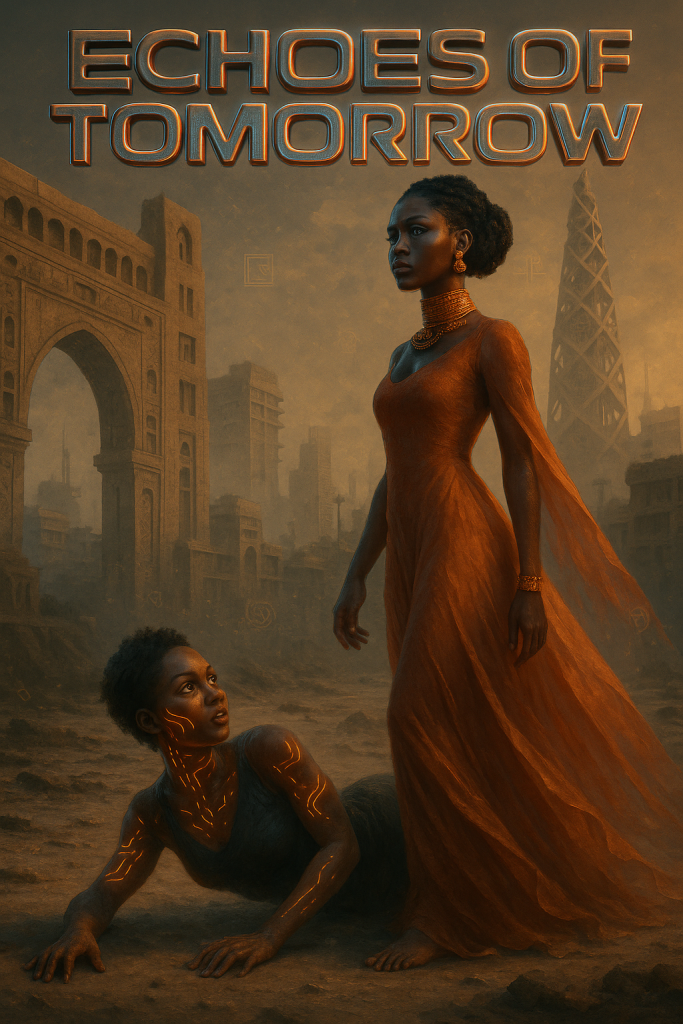ECHOES OF TOMORROW

Echoes of Tomorrow
They say life is an echo—what we send out comes back to us. Sometimes it whispers softly in the corners of our hearts; sometimes, it crashes like a wave against our soul. For Anvil and Diazy, it began with the gentle laughter of friendship and ended in the hollow silence of betrayal.
They were best friends. From the moment they met in secondary school, their bond was instant—woven by shared dreams, inside jokes, and a belief that no matter where life led them, they would walk the road together. But fate, in its strange designs, had other plans.
Diazy came from a wealthy and influential family. Her father was a renowned architect, her mother a pediatrician. Their home was filled with warmth, laughter, and the aroma of scented candles. Her room, tucked in the east wing of their whitewashed mansion, was a sanctuary lined with books and vision boards of her dreams to study Pharmacy in West London University.
Anvil, on the other hand, was born into simplicity. Her father, a retired civil servant; her mother, a petty trader. Their home was modest—two bedrooms in a small compound where the sound of generators hummed into the night. But what Anvil lacked in wealth, she made up for with grit, humility, and a heart larger than life.
When university admission time came, Diazy’s path seemed clear—an offer to study Pharmacy at West London University. It was everything she had worked for. But when she looked into Anvil’s eyes—eyes that had hoped to follow her abroad—she paused. Anvil didn’t make the cutoff for Pharmacy or for an international school. She had been offered Microbiology in a federal university down south.
Torn between ambition and friendship, Diazy made a decision her parents didn’t understand. She turned down her London dream, opting instead to study in Nigeria—so she could stay close to Anvil. “We’ll still rule the world together,” she had said, gripping Anvil’s hand with a smile.
They got admitted into the same department, though different courses. They shared hostels, food, study nights, and late-night walks under the moon. Their laughter echoed through campus. They were inseparable.
But then, time began to change things.
In Anvil’s 200-level, tragedy struck. Her uncle, who had been sponsoring her education, died suddenly from cardiac arrest. Everything changed. The bills piled up. She wore the same clothes more often. Her phone became silent. The girl who once dreamed in color began to fade into gray.
Then came Joxboz.
He was older, mysterious, always in clean designer clothes and driving a dark blue Mercedes with tinted windows. They met at a lounge near campus. He noticed her, paid her bills, and within a week, began calling her “Queen.” By her second semester, he had taken over her entire financial burden. She now wore perfume that smelt of foreign cities and carried iPhones newer than the girls in her class. She disappeared on weekends, saying she had “family things.”
But even Diazy didn’t suspect anything.
Anvil and Joxboz grew close—too close. He applied for visas for both of them, and within weeks, they were approved. Anvil never told Diazy. She didn’t tell her parents either until it was time to leave. She left a month before the semester exams, abandoning her courses, her responsibilities, and her best friend.
When Diazy heard the news from Anvil’s younger brother, her world cracked. She couldn’t believe it—Anvil? London? With a man she never mentioned?
She tried to call her. No answer.
She texted her on WhatsApp. Message sent. Not delivered.
She commented on her Instagram story—“I miss you.” No reply. Only pictures followed: Anvil in Hyde Park. Anvil in front of Harrods. Anvil with Joxboz, his arm around her waist.
The sting was sharp. Not just betrayal—but abandonment.
Diazy cried like a wounded bird that night. She remembered everything she had given up—her dream school, her scholarship, her future—just so she and Anvil could stay close. And now, she was the one left behind.
Her parents held her. Her father, for the first time in years, cried with her. “We thought she was a friend,” her mother whispered.
But Diazy was not the kind of girl to break forever. The next morning, she rose, washed her tear-streaked face, and tied her scarf. She looked in the mirror—her eyes swollen, but fierce.
She walked to the school library that day, not because she wanted to study, but because she needed to prove to herself that she could still stand.
That she could still echo into tomorrow.Because life may echo our choices, but it does not end in the pain of yesterday.





